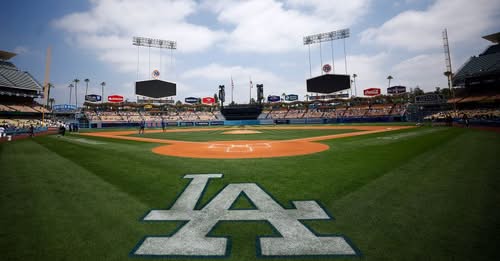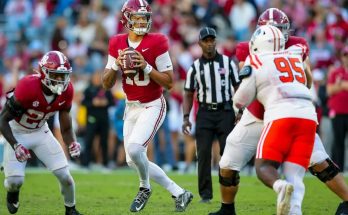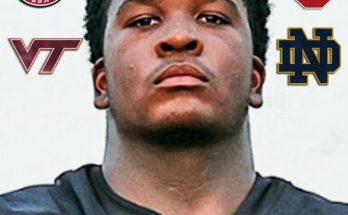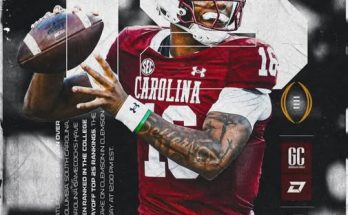Tensions are running high in Los Angeles as the iconic Dodgers organization finds itself embroiled in a bitter and unexpected standoff with the Trump administration. At the heart of the conflict is the controversial presence of federal agents stationed at Dodger Stadium, a decision that has sparked outrage among local leaders, fans, players, and civil rights advocates alike. What was once a beloved cathedral of baseball is now the focal point of a larger national debate on federal authority, public safety, and the balance between politics and sports.
The conflict began quietly, almost under the radar, with reports surfacing that federal agents had been deployed at Dodger Stadium ostensibly for “public safety operations.” However, sources close to both the team and city officials quickly confirmed that the Dodgers had not been notified in advance of this move and were blindsided by the presence of plainclothes and uniformed federal personnel on stadium grounds. Almost immediately, questions arose regarding the purpose of their deployment, who authorized it, and what it meant for the broader community that rallies around the team.
For the Dodgers, this wasn’t just a matter of logistics or protocol. The organization, one of the most progressive in all of professional sports, took issue with what it viewed as a federal overreach that compromised the trust and safety of their fans. With Los Angeles being one of the most diverse cities in America—home to vibrant Latino, Asian, Black, and immigrant communities—the symbolic weight of seeing federal agents patrolling a sports venue deeply disturbed many. For those who have historically been targeted or profiled by federal authorities, especially during the Trump administration’s hardline immigration enforcement era, the move felt like a chilling throwback to darker times.
In a rare and forceful statement, a Dodgers spokesperson condemned the federal presence at the stadium as “unnecessary, uninvited, and inconsistent with the values of our organization and community.” The statement emphasized the team’s commitment to making Dodger Stadium a welcoming and safe space for all Angelenos and rejected any attempt to militarize or politicize a place meant to unify people through the love of baseball. Fans were quick to support the team’s stance, flooding social media with hashtags like #KeepPoliticsOffTheField and #NoFedsAtTheStadium.
City officials echoed the Dodgers’ concerns, with Los Angeles Mayor Karen Bass and several members of the city council demanding answers from the Department of Homeland Security and the Trump-aligned federal agencies involved in the operation. During a fiery press conference outside City Hall, Mayor Bass blasted the move as “federal interference masquerading as public safety,” and warned that the city’s cooperation with federal authorities could be reevaluated if such actions continued without transparency or local coordination.
Sources within the Trump-aligned administration defended the operation, saying the deployment of federal agents was part of a broader initiative to safeguard “high-traffic, high-profile public venues” in the wake of increasing threats across major U.S. cities. A White House spokesperson issued a brief statement insisting the presence of federal agents was “strictly preventative” and “in the interest of public safety.” However, the lack of coordination with local law enforcement and the Dodgers organization undermined any assurances of good intentions.
The Dodgers, for their part, initiated closed-door meetings with Major League Baseball, federal officials, and the Los Angeles Police Department in an attempt to de-escalate the situation. Several players reportedly voiced discomfort with the federal presence, particularly those from immigrant backgrounds or those who had previously spoken out on social justice issues. One player, who asked to remain anonymous, said, “This is supposed to be our home, a safe place. Now it feels like we’re being watched or policed for no reason. It’s not right.”
Community groups swiftly mobilized in protest. Outside the stadium, dozens of activists gathered with signs reading “Our Stadium, Our City” and “No to Trump’s Feds.” Many in attendance said they feared that the presence of federal agents could lead to immigration sweeps, despite the administration’s assurances. Others pointed out that in previous years, similar federal deployments in places like Portland, Oregon, led to unlawful detentions, civil rights violations, and public unrest. The message from the Los Angeles community was clear: this would not be tolerated.
Beyond the local impact, the situation has taken on national implications. Prominent political figures weighed in, with California Governor Gavin Newsom calling the deployment “reckless and politically motivated.” On the other side, former President Trump defended the move in a Truth Social post, saying, “The Los Angeles Dodgers should be thanking the federal government for keeping fans safe from crime and chaos. Shameful that they care more about woke politics than law and order.” The post only added fuel to the fire, framing the issue as another front in the broader culture war that has consumed American politics.
Major League Baseball has so far remained largely silent on the controversy, though Commissioner Rob Manfred is reportedly “monitoring the situation closely.” According to league sources, there are concerns that the federal involvement at Dodger Stadium could set a dangerous precedent, where political agendas intrude into the apolitical space of sports. If unchecked, the worry is that other stadiums in Democratic-leaning cities could face similar encroachments, turning ballparks into battlegrounds.
Legal experts have also begun weighing in. Constitutional scholars point out that while the federal government does have jurisdiction over certain national security matters, deploying agents at a privately operated sports facility without prior coordination is highly unusual and may violate principles of federalism and local autonomy. Some have suggested the Dodgers or the city of Los Angeles could pursue legal action to prevent future incursions, though no official litigation has been filed as of yet.
Meanwhile, fans are caught in the crossfire. Season ticket holders, many of whom bring children or elderly family members to games, have expressed hesitation about returning to the stadium under current circumstances. “It doesn’t feel like a ballgame anymore,” one fan remarked. “It feels like we’re walking into a checkpoint or surveillance zone. That’s not what Dodgers baseball is supposed to be about.”
Despite the controversy, the Dodgers have remained steadfast in their commitment to their community. In the days following the incident, the team held a public event celebrating local Hispanic heritage, inviting families, small businesses, and nonprofit leaders to Dodger Stadium in a show of unity. Several players gave heartfelt speeches about inclusivity, diversity, and the healing power of sport. One moment, in particular, stood out—when a young boy from Boyle Heights stood on the mound and threw the ceremonial first pitch, wearing a jersey with the words “Todos Son Bienvenidos” (“All Are Welcome”).
The Dodgers also announced new community partnerships aimed at supporting immigrant families and legal advocacy organizations, pledging to contribute a portion of ticket proceeds toward defending civil rights and expanding outreach programs. These moves underscored the team’s desire not just to condemn the federal action, but to actively resist and counteract it with meaningful support for those affected.
As the situation continues to unfold, the Dodgers have become more than just a baseball team—they are now a symbol of resistance, inclusion, and the ongoing battle over who controls public spaces and narratives in America. In a time of deep division, their stance has resonated far beyond the foul lines and box scores.
While it remains to be seen how the standoff will ultimately be resolved, one thing is certain: the Los Angeles Dodgers have made it clear that their stadium is not a staging ground for federal enforcement—it is a sanctuary for unity, joy, and the enduring spirit of the game. And in this heated confrontation with the Trump administration, they have drawn a line in the dirt that echoes the resolve of a city—and a nation—refusing to be silenced.



